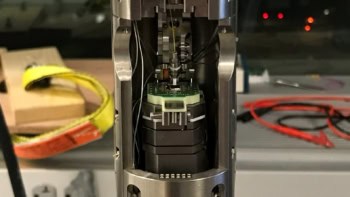DNA molecules - the building blocks of life - can conduct electricity as efficiently as a good semiconductor according to two Swiss physicists. Hans-Werner Fink and Christian Schönenberger from the University of Basel say that DNA's electrical properties make it "ideally suited for the construction of mesoscopic electronic devices" (Nature 398 407).
Fink and Schönenberger made their measurements by placing discrete amounts of DNA molecules in a water-based solution. A tiny droplet of the solution was then placed onto a gold-coated carbon foil. Blotting paper was then used to remove most of the water on the device, causing some of the individual DNA molecules to span the holes in the foil. According to their calculations, these strands coalesce into a DNA ‘rope’ 2 microns in diameter.
By using a low-energy coherent electron beam from a LEEP microscope, Fink and Schönenberger were able to visualise the DNA strands without damaging the molecules. Next they used a mechanical tip to break one end of the DNA rope away from the foil. The tip was then used to create a small measurable voltage between this end of the rope and the foil.



